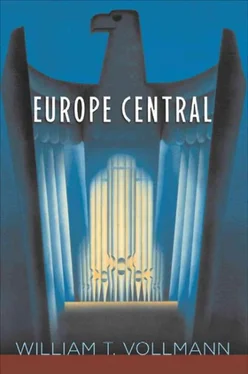723 Glikman’s brother’s idea for Shostakovich’s gravesite, and his recapitulation of Irina’s reaction—G. Glikman, in Schmalenberg, p. 178 (trans. by WTV). In this memoir, Glikman says “Petrograd,” not “Leningrad.”
724 Bely: “All of Petersburg is an infinity of the Prospect…” — Andrei Bely, Petersburg, trans. Robert A. Maguire and John E. Malmstad (Bloomington: Indiana University Press, 1978), p. 12 (slightly altered).
724 “… and the living faces the color of dirt, and that severed arm which hung from the garden gate…”—Punin, p. 191 (entry for Leningrad, 13 December 1941): “For a long time there hung an arm up to the elbow, attached by someone to the fence of the garden of one of the destroyed buildings. Dark crowds of people walk past with faces swollen and earthlike.”
725 Nadezhda Mandelstam (footnote): “I can testify that nobody I knew fought…”—Mandelstam, p. 307.
727 Non-appearance of Shostakovich’s name in the Urals poll— The Soviet Way of Life, p. 395 (ch. 9: “The Society of Great Culture”).
A PIANIST FROM KILGORE
728 Epigraph—Jakov Lind, Soul of Wood, trans. Ralph Manheim (New York: Hill and Wang, 1964; orig. German ed. 1962), p. 46 (“Soul of Wood”).
730 Professor Svetlana Boym, who happened to be a fellow at the American Academy during my own brief residence there in 2003, proposes that I’ve misconceived the Russians’ anti-American attitude. In her view they wouldn’t have been anti-Cliburn at all. Instead of Cliburn representing something baleful, she says, he would have simply been isolated and forgotten as his Russian colleagues got drunk and chased women.
730 The juror Oborin: “Good, really very good…”—Paperno, p. 209.
731 New York Times: “A big, percussive attack…”—Issue of 11 April 1958, p. 12, col. 5.
732 Sofiya Gubaidulina: “Dmitri Dmitreyvich, you’re the person our generation depends on…”—Very loosely based on her retrospective testimony in Wilson, pp. 304-05.
733 The premiere of “Far and Wide My Country Stretches”—I am taking a liberty here, not knowing exactly when this film of Roman Karmen’s first appeared. The Great Soviet Encyclopedia tells me only that it was released in 1958, the year that Cliburn won the competition.
736 General von Hartmann: “As seen from Sirius, Goethe’s works will be mere dust…” —Craig, p. 373, slightly reworded.
737 Footnote: Great Soviet Encyclopedia: “Spontaneity, straightforward lyricism, exultant sound and impetuous dynamism.”—Vol. 12, p. 121 (entry on Harvey Lavan Cliburn, Jr.).
LOST VICTORIES
I would have preferred to set this story in 1958, when “Lost Victories” first appeared, rather than in 1962; then the parallelism with “The Pianist from Kilgore” would have been more exact; unfortunately, the Berlin Wall was not erected until 1961. It seemed best to make the events of the story occur a year later, so that the narrator could consider the Wall a settled injustice rather than a brand new outrage.
738 Epigraph—Von Manstein, p. 29.
739 “Had Paulus only been permitted [by Hitler] to break out and link up with von Manstein’s troops…”—Interestingly enough, Paulus seems to have blamed both Hitler and von Manstein. The ambiguously kidnapped Jahn had an opportunity to speak with him in 1954, in the office of Herr Weidauer, the Bürgermeister of Dresden. Jahn describes him (pp. 258-61) as a broken man, talking pitiably about his decorations.
740 “A great German”: “The strong man is mightiest alone.”—The great German was Schiller, but Hitler loved to quote this aphorism.
740 Speaking of great Germans, here is what the Great Soviet Encyclopedia (vol. 15, p. 436, biographical entry) has to say about von Manstein: “an honorary member of a number of revanchist circles.” 49 49 My own assessment of the man has much to do with the following remark in “Lost Victories” (p. 533): “I can only say that it was not granted to me—as one who had for several years past been engrossed in arduous duties at the front—to perceive Hitler’s real nature, or the moral deterioration of the régime, to the extent to which we can obviously do today. Rumors of the kind that circulated at home hardly penetrated to the front, perhaps least of all to ourselves.” I can accept this to an extent, but, as the Nuremberg Trial verdicts insisted, blindness at some point becomes culpability. Moreover, what does “moral deterioration” mean? Did he think the Third Reich to be moral at its inception? Did the mass murder of the Brownshirts and the opening of concentration camps at the very beginning not trouble him?
740 Von Manstein: “When Hitler called for the swift and ruthless destruction of the Polish Army…”—Von Manstein, p. 190.
740 Von Manstein: The capitulation of Poland “in every way upheld the military honor…”—Ibid., p. 59.
741 Von Manstein: As a result of the impeccable behavior of our troops…”—Ibid., p. 151.
742 Von Manstein: “From now on the weapons would speak.”—Ibid., p. 33.
743 “Lili Marlene”—Mr. Thomas Melle would have me write the German “Lili Marleen,” but I have never seen it this way in any Anglo-American World War II source, so I fear it would look wrong to my readers.
743 Von Manstein on the Soviet troop dispositions—“Deployment against every contingency” —Op. cit., p. 181.
743 Von Manstein: “The Soviet command showed its true face…”—Ibid., p. 180.
THE WHITE NIGHTS OF LENINGRAD
After completing this story I discovered the following footnote in Moholy-Nagy (p. 15): “The interplay of various facts has caused our age to shift almost imperceptibly toward colour-lessnessand grey: the grey of the big city, of the black and white newspapers, of the photographic and film services; the colour-eliminating tempo of our life today. Perpetual hurry, fast movement, cause all colours to melt into grey.”
748 Ansel Adams: “…lightly charmed by the passing landscape…”—Ansel Adams, Examples: The Making of 40 Photographs (Boston: Little, Brown & Co, 1983), p. 117 (commentary on his photograph of Jacques Henri Lartigue).
AN IMAGINARY LOVE TRIANGLE: SHOSTAKOVICH, KARMEN, KONSTANTINOVSKAYA
For my own narrative purposes I have invented many of the interrelations between these three individuals.
According to Khentova’s Udivitelyenui Shostakovich, Konstantinovskaya returned from Spain married to Karmen. He was doing documentary work there in 1936 and 1937.
Konstantinovskaya and Shostakovich were intimate for slightly more than a year, from around June 1934 until some time in 1935, probably the late summer or fall, shortly after which she was expelled from the Komsomol and arrested. She seems to have been in prison for a year or less. So I imagine her as having volunteered for duty in Spain in 1936. I have no way of knowing whether she had the gruesome Gulag experiences which I have imputed to her.
It is a fact that she received the Red Star for bravery in Spain. Very likely she was a combatant. Possibly she saw action with a Soviet tank brigade. However, I have been unable to find out any details about her service in Spain. It is the fact of her Red Star which decided me to give her expertise in sharpshooting and first aid while in the Komsomol.
Karmen’s memoir Über die zeit und über mich selbst: Erzählungen über mein Schaffen states that his wife was expecting to give birth on 22 June 1941. The portions of the book which I was able to read in Berlin do not state which wife this was. She might well not have been Elena, because almost immediately after the newlyweds returned to the USSR in 1937 Karmen set out on other long journeys, which doesn’t imply the closest of marriages; on the other hand, good Soviet citizens were accustomed to putting their families second. In Europe Central I have supposed that the expectant mother was Elena.
Читать дальше












